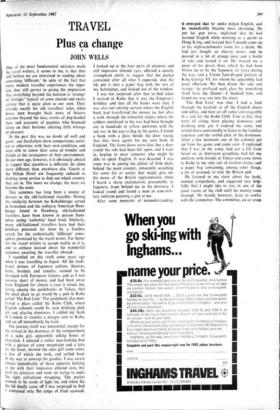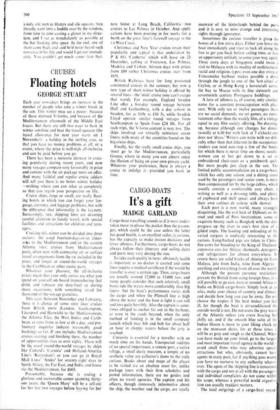Plus ca change TRAVEL
JOHN WELLS
One of the most fundamental mistakes made by travel writers, it seems to me, is that they still believe we are interested in reading about something 'different.' In spite of the fact that every modern traveller experiences the oppo- site, they still persist in giving the impression that everything beyond the horizon is 'strange' or `foreign,' typical' of some ancient and exotic culture that is quite alien to our own. Their attitude recalls the old travellers' tales, when brave men brought back news of bizarre customs beyond the seas, stories of dog-headed men, and accounts of pygmies who bounced along on their bottoms emitting little whoops of pleasure.
In the past this was no doubt all well and good: our forefathers drew comparisons, satiri- cal or otherwise, with their own condition, and were able to renew their sense of wonder and delight at the strangeness of their environment. In our own age, however, it is obviously absurd to suggest that anywhere is different, let alone more different than anywhere else. Guests at the Hilton Hotel are frequently reduced to dialling room service to find out which country they are in. The more we change, the more we become the same.
This sameness has long been a source of distress to the old-fashioned traveller. Noting the similarity between the Kebabburger served in Jerusalem and the ordinary American Ham- burger found in Hamburg, old-fashioned travellers have been known to poison them- selves eating 'authentic' local food. Similarly, many old-fashioned travellers have had their holidays poisoned for them by a fruitless search for the authentically 'different' atmo- sphere promised by the travel writer. Far better for the travel writers to accept reality as it is, and to enthuse instead about the wonderful sameness awaiting the traveller abroad.
I stumbled on this truth some years ago when I was travelling in Japan. All the tradi- tional shrines of Japanese culture, theatres, baths, brothels and temples, seemed to be thronged with European visitors, and as I was anyway short of money and had been away from England for almost a year it struck me, sitting among the guidebooks in Tokyo, that the ideal place to go would be a pub in Kobe called 'The Red Lion.' The guidebook also men- tioned a place called the Kobe Club, where English colonels could be seen drinking pink gin and playing dominoes. I cabled my bank in London to transfer a meagre sum to Kobe, and set off immediately by train.
The journey itself was uneventful, except for the arrival in the doorway of the compartment
of a sales girl, apparently selling boxes of
chocolate. I selected a rather nice-looking box with a picture of some mountains and a lake on the front, showed the sales girl some coins,
a few of which she took, and settled back in my seat to unwrap the goodies. I was aware almost immediately of those opposite looking at me with their impassive almond eyes, but paid no attention and went on frying to undo the tight cellophane wrapping. The packet seemed to be made of light tin, and when the the lid finally came off I was surprised to find it contained only flat strips of fried seaweed. I looked up at the four pairs of attentive and still impassive almond eyes, affected a quietly triumphant smirk to suggest that the packet contained after all what I expected, shut the lid, put it into a paper bag with the rest of my belongings, and looked out of the window.
I was not surprised after that to find when I arrived in Kobe that it was the Emperor's birthday and that all the banks were shut. I was also not entirely certain where the English bank had transferred the money to, but after a walk through the colourful streets, where the soldiers mutilated in the war had been brought out in hundreds in yellow uniforms with the red star in the cap to beg in the gutter, I found a bank with a plate beside the door saying that they were agents for my own bank in England. The front doors were shut, but a door round the side had been left open, and I went in, hoping to meet someone who might be able to speak English. It was deserted. I was some way in among the clutter of little desks behind the main counter, innocently searching for some list or notice that might give me the name of the British representative, when I heard a sharp exclamation, presumably in Japanese, from behind me in the doorway. I looked round and found a man in semi-mili- tary uniform pointing a gun at me.
After some moments of misunderstanding it emerged that he spoke pidgin English, and he immediately became most charming. He put his gun away, explained that he had learned English while working as a pirate in Hong Kong, and insisted that I should come up to his nightwatchman's room for a drink. He had just bought an electric mixer, and he poured in a tin of orange juice and a bottle of saki and turned it on. He showed me a piece of his pirate boat, which he had been blown up in by the Japanese air force during the war, and a Union Jack-draped portrait of King George VI, for whom he apparently had great affection. We then drank the saki and orange—he prefaced each glass by remarking 'God Save the Queen'—I thanked him, and found my way out into the street.
'The Red Lion' was shut. I had a look through the keyhole at all the English chairs
and tables, and then set off rather extravagantly in a taxi for the Kobe Club. True to life, they were all sitting there playing dominoes and drinking pink gin. I ordered the same, and settled down contentedly to listen to the familiar cadences and the restful click of the dominoes.
After a few moments one of the colonels got up from his game and came over. I explained that I was in the army, had got a lift from Seoul on an American aeroplane. had left my uniform with friends in Tokyo and come down to Kobe in my only suit of civilian clothes and a paper bag containing, among other things, a tin of seaweed, to visit the British pub.
He listened to my story about the bank, seemed sympathetic, and suggested very help- fully that I might like to stay in one of the guest rooms of the club until the money came through. He would, however, have to confer with the committee. The committee, six or seven
kindly old men in blazers and silk squares, then literally went into a huddle over by the window, from time to time casting a glance in my diret- tion, and I sat as nonchalantly as possible at the bar looking into space. In the end, one of them came back and said he'd never heard such nonsense in his life and would I get out immedi- ately. You couldn't get much samer than that.































 Previous page
Previous page